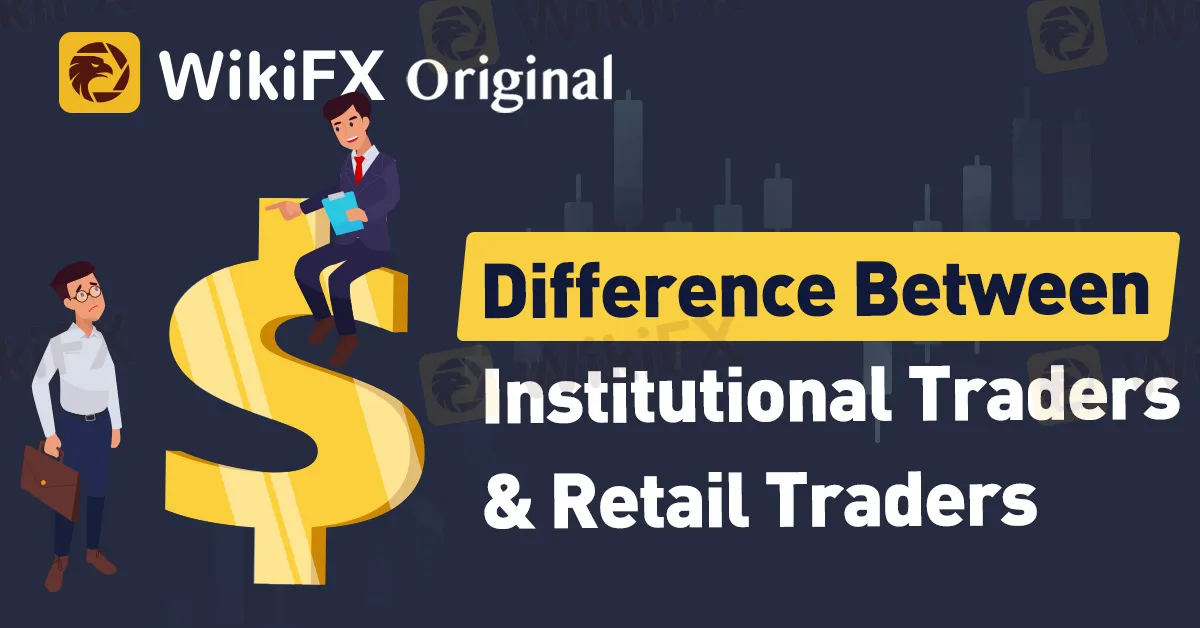简体中文
繁體中文
English
Pусский
日本語
ภาษาไทย
Tiếng Việt
Bahasa Indonesia
Español
हिन्दी
Filippiiniläinen
Français
Deutsch
Português
Türkçe
한국어
العربية
Difference Between Institutional Traders & Retail Traders
Abstract:The article explores the differences between institutional traders and retail traders, highlighting their unique advantages, access to securities, and potential paths of transition between the two.

The world of securities trading encompasses a spectrum of approaches, from the simplicity of retail trading to the complexities of institutional trading. Retail traders, often individuals, engage in personal securities transactions, while institutional traders manage accounts for groups or institutions such as pension funds, mutual fund families, insurance companies, and ETFs.
Although advancements in technology and access to information have narrowed the advantages once held by institutional traders, certain distinctions remain. Institutional traders still enjoy access to a wider range of securities, the ability to negotiate fees, and assurances of best price and execution.

Institutional traders can delve into complex transactions like forwards and swaps that are typically beyond the reach of retail traders. Moreover, institutions are often presented with investment opportunities in IPOs and can negotiate basis point fees while avoiding marketing or distribution expenses.
Given their substantial trading volume, institutional traders possess the power to significantly impact the share price of a security. To mitigate this influence, they may split trades among various brokers or execute them over time.
The size of an institutional fund influences the market capitalization of the securities it owns, with larger funds generally favoring higher-cap stocks. Smaller-cap stocks pose challenges for institutional traders as their investment might result in majority ownership or reduced liquidity due to limited counterparty participation.

Retail traders primarily engage in stocks, bonds, options, and futures, with limited access to IPOs. They typically trade in round lots, although the flexibility to trade any number of shares exists. Retail traders may encounter higher trading costs if they utilize brokers with flat fees per trade along with marketing and distribution expenses. Given the relatively smaller number of shares they trade, retail traders have minimal impact on security prices.
Unlike institutional traders, retail traders are more inclined to invest in small-cap stocks due to their affordability, facilitating diversified portfolios comprising multiple securities.
Interestingly, retail traders often transition into institutional traders. Starting with personal trading accounts, successful retail traders may expand their scope to include trades for friends and family. Continued success and the accumulation of capital from other investors can lead to the establishment of a small investment fund, paving the way for the transformation into institutional traders.
While institutional traders and retail traders have distinct characteristics, their paths can intertwine as retail traders progress towards managing institutional-level portfolios, exemplifying the evolutionary nature of the trading landscape.

Disclaimer:
The views in this article only represent the author's personal views, and do not constitute investment advice on this platform. This platform does not guarantee the accuracy, completeness and timeliness of the information in the article, and will not be liable for any loss caused by the use of or reliance on the information in the article.
Read more

Good News Malaysia: Ready for 5% GDP Growth in 2025!
Malaysia's economy is on track to sustain its robust growth, with GDP expected to exceed 5% in 2025, according to key government officials. The nation's economic resilience is being driven by strong foreign investments and targeted government initiatives designed to mitigate global economic risks.

Tradu Introduces Tax-Efficient Spread Betting for UK Traders
Tradu’s introduction of tax-efficient spread betting and groundbreaking tools like the Spread Tracker signals a new era of accessible, competitive, and innovative trading solutions for UK investors.

Trading Lessons Inspired by Squid Game
The popular series Squid Game captivated audiences worldwide with its gripping narrative of survival, desperation, and human nature. Beneath the drama lies a wealth of lessons that traders can apply to financial markets. By examining the motivations, behaviours, and strategies displayed in the series, traders can uncover valuable insights to enhance their own approach.

RM5.9M Lost to "Davidson Kempner Capital Management" Facebook Scam
A private contractor in Malaysia faced a devastating loss of over RM5.9 million after falling victim to a fraudulent investment scheme promoted on Facebook. Tempted by the scheme’s impressive claims and credentials, the victim began investing in September 2024. The investment process required him to download an application called A-Trade, which was readily available on the Apple Store.
WikiFX Broker
Latest News
SQUARED FINANCIAL: Your Friend or Foe?
Big News! UK 30-Year Bond Yields Soar to 25-Year High!
High-Potential Investments: Top 10 Stocks to Watch in 2025
Why Is Nvidia Making Headlines Everywhere Today?
Discover How Your Trading Personality Shapes Success
US Dollar Insights: Key FX Trends You Need to Know
FINRA Charges UBS $1.1 Million for a Decade of False Trade Confirmations
BI Apprehends Japanese Scam Leader in Manila
Bitcoin in 2025: The Opportunities and Challenges Ahead
Join the Event & Level Up Your Forex Journey
Currency Calculator






